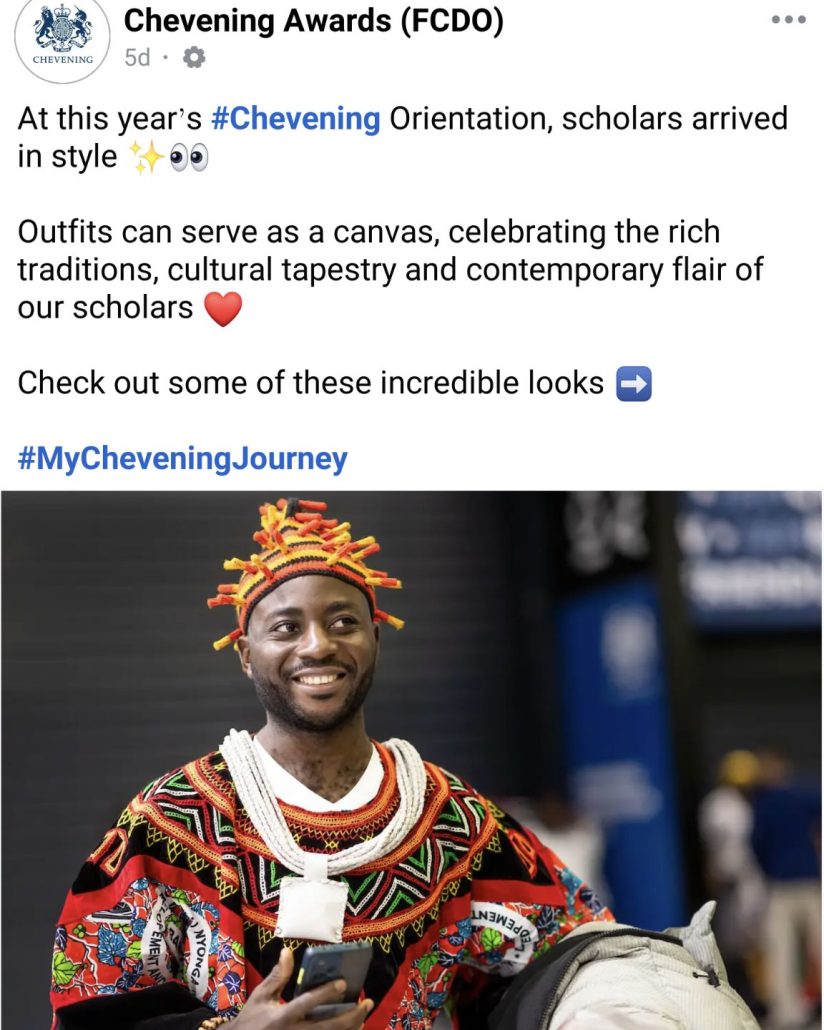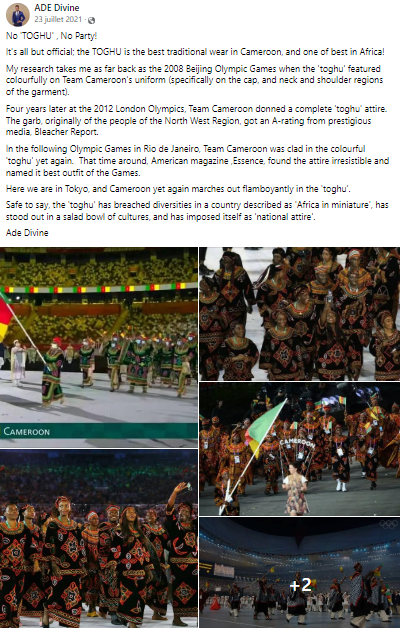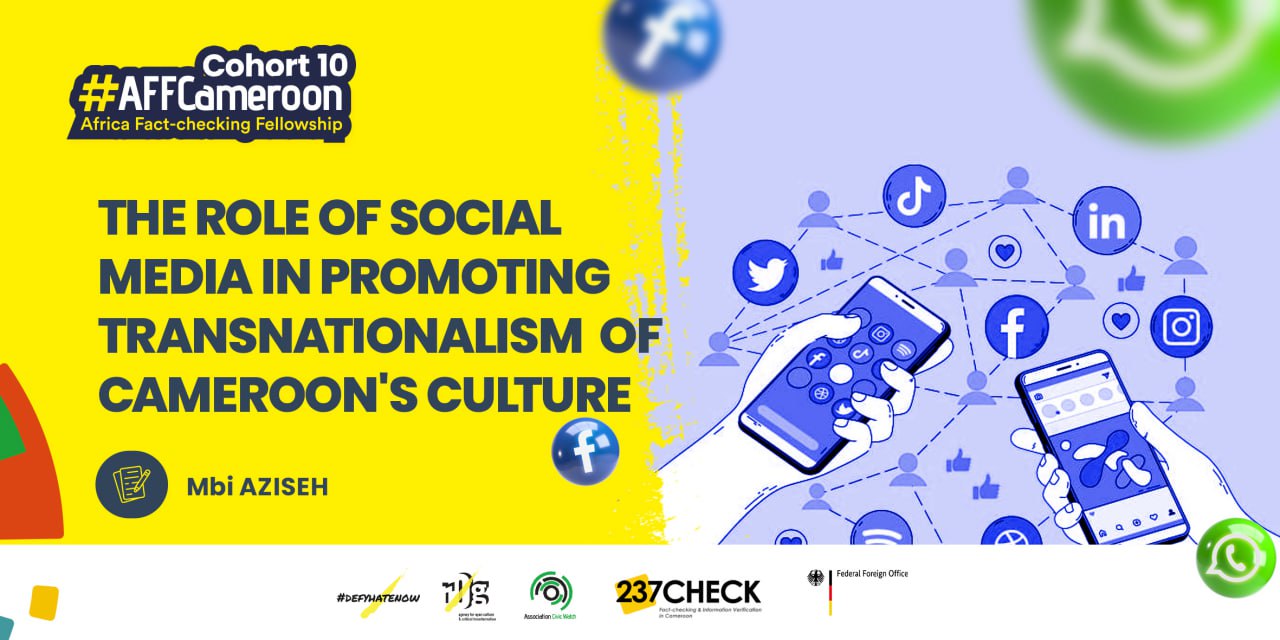Introduction
Technological advancements have enabled digital connectivity to transcend geographic, social, religious, and cultural boundaries. Social media, a product of technological innovation, has become a transformative force, redefining how cultures interact, evolve, and influence one another. Cameroon, considered as Africa imminature, is celebrated for its rich cultural diversity,traditions, and dynamic youth population. Social media has become a platform for showcasing its cultural identity on a global stage. Through platforms like Instagram, Facebook, TikTok, and Twitter, Cameroonians are leveraging digital tools to share their music, art, sports, and narratives, fostering the transnationalism’s effect on Cameroon’s culture by redefining their global footprint.
Transnationalism refers to the processes and activities that transcend national boundaries, fostering connections and interactions among people, organizations, and institutions across different countries. It highlights the increasing interdependence and interconnectedness of the world in various domains such as politics, economics, culture, and social interactions. According to Richard Huff, professor of public policy at Virginia Commonwealth University, he defines transnationalism as an economic, political, and cultural processes inthat extend beyond the boundaries of nation-states .
In this article, we will look into the role of social media in promoting cultural transnationalism of Cameroon. By examining key trends, music influencers, sports blogging platforms, culture and content that have gained global traction, we aim to understand how Cameroonians are shaping their cultural narratives in the digital age.
Body
Over the years, Cameroon has been able to blossom in the international stage through its numerous achievements in diverse sectors like sport, culture, music and food. In football, the 1990 exploits of the team in the football world cup and the numerous Africa cup of Nations which she has won .the beautiful genre of Cameroon music like bitkussi, assiko and makossa was worldly acclaimed the 1980s and 1990s. In today’s world Social media platforms have also played a pivotal role in enhancing and spotlighting Cameroon’s diverse cultural elements, creating a virtual gateway for global audiences to experience its heritage.
From the Toghu, a traditional attire which originates from the people of the grassfield in Cameroon, precisely in the Northwest Region, Kabba Ngondo from the Littoral region to the Ndop fabric worn by Bamilike people in West Cameroon showcase the rich cultural diversity of Cameroon. The rich flavors of Ndolé, a signature dish that tantalizes taste buds worldwide, social media is showcasing the depth of Cameroon’s cultural identity. These cultural elements, coupled with the global resonance of Cameroonian music from the rhythmic beats of Makossa to Mbole, paint a picture of a nation deeply rooted in tradition yet dynamically connected to the world. Social media has transformed how these cultural treasures are shared and celebrated. Platforms like Instagram, TikTok, and YouTube have turned a Toghu into a fashion statement beyond Cameroon’s borders, celebrated on runways and red carpets globally. Meanwhile, Ndolé recipes and cooking tutorials flood digital spaces, inviting people from diverse backgrounds to experience Cameroon’s culinary richness. Cameroonian artists are using these platforms to amplify their music, fostering collaborations with international stars and cementing Cameroon’s place in the global music scene.
The Toghu has transcended its origins to become a national and global cultural emblem. Worn by Team Cameroon at multiple Olympic Games, from Beijing in 2008 to Paris in 2024, it has earned praise from international media such as Essence and Bleacher Report for its striking artistry and cultural significance. Beyond sports, the Toghu’s appeal has crossed borders, embraced by personalities in other countries like Nigeria, including actors Ken Erics, Nkem Owoh, Alex Ekubo, and gospel artist Frank Edwards, who have proudly donned this iconic attire. Showcased at events like the Chevening Orientation Session, Mandela Washington Fellowship and National events like 20th May. The Toghu not only unifies Cameroon’s diverse cultures but also serves as a shining example of Africa’s rich artistic heritage.The Toghu name and design gained global recognition as it was considered by Essence Magazine as the best olympic attire in 2016. In the 2021 Africa Cup of Nations in Cameron, the ball used was called Toghu and was designed according to the grassfield attire.
Again, the Facebook page Sauvons le Ndop has been instrumental in promoting the Ndop fabric which originates from the west region of Cameroon as a cultural symbol of the Grassfield people in Cameroon. By regularly sharing educational content about its history, craftsmanship, and significance, the page has raised awareness and appreciation for this traditional textile. It showcases various uses of the fabric in ceremonies, modern fashion, and home decor, effectively bridging the gap between tradition and contemporary trends. Furthermore, the page highlights the fabric’s symbolic value within cultural and spiritual practices, fostering a sense of pride in its heritage and encouraging its preservation in a rapidly modernizing world.
@versusglobal Nigerian celebrities in the Toghu outfit. A Traditional wear from the NW region of Cameroon🇨🇲. Junior Pope and his family looked so beautiful in this particular outfit. Happy posthumous birthday to him and may his soul continue to rest in peace 🕊️#Popejunior #ripPopejunior #Fyp #duet #toghu #Bamendaman
♬ original sound – Young Holiday


In the field of music, Cameroonian artists like Charlotte Dipanda and Bad Nova are emerging as cultural ambassadors, blending traditional rhythms such as “Bole” with contemporary genres to create a unique and captivating sound. Charlotte Dipanda’s soulful melodies have earned her a global fan base, showcasing Cameroon’s rich musical heritage through heartfelt storytelling and exceptional artistry. Meanwhile, Bad Nova has taken the international stage by storm with hisr viral hit Hala Madrid, a tribute to the legendary football club Real Madrid. The song was shared by Real Madrid players like Federico Valverde and Vinícius Júnior sharing it, and the club’s official fan pages amplifying its reach. The Bole rhythm has sparked a worldwide dance challenge, with fans from diverse backgrounds celebrating Cameroon’s innovative musical style. He recently did a presentation in the TV program “J-1 at Canal + Afrique with over 8 million followers on their Facebook page.
Again, the remix of Viviane by Prince Aimé, featuring Cameroonian artists Maahlox, Magasco, Lili Anoma, and Thérapie, quickly gained traction, accumulating more than 4 million views within the first 24 hours of its release. Influencers, blogs and public figures like Samuel Etoo, Cercle de star dur 237 Rigobert song
and platforms across social media, including TikTok and YouTube, actively shared the song, contributing to its viral success. On TikTok, users creatively engaged with the track, producing videos and amplifying its reach among younger audiences. The song transcended Cameroon’s borders, as many renowned artists like Yemi Alade have done covers or remixes of the song,capturing international attention and serving as a representation of Cameroon’s vibrant music scene. The fusion of diverse styles and the collaboration of renowned artists underscored its global appeal, promoting the richness of Cameroon’s musical culture on the international stage.
Sports have long been a unifying force in Cameroon and figures like Francis Ngannou epitomize this role, becoming a global ambassador for Cameroon and Africa as a whole. The UFC heavyweight champion and now a boxing contender, Ngannou carries his Cameroonian heritage with pride, drawing unwavering support from across the African continent during his high-profile matches against Anthony Joshua and Tyson Fury. Fans from countries like Nigeria, Ghana,DR Congo and South Africa rallied behind Ngannou, celebrating him as a symbol of African strength, resilience, and excellence. His philanthropic work through the Francis Ngannou Foundation, which focuses on empowering young Cameroonians through education and sports, further cements his role as a continental hero, inspiring the next generation. Francis Ngannou’s phenomenal success as the UFC Heavyweight Champion and his transition into professional boxing has brought global attention to Cameroon and his hometown, Batié. International media outlets, such as France 24, which boasts over 12 followers on Facebook and 7 million subscribers on YouTube, have produced detailed documentaries and features on his journey from humble beginnings to global stardom. These stories have highlighted not only his remarkable resilience and dedication but also the rich cultural heritage of Cameroon and the village of Batié. Through interviews, behind-the-scenes footage, and personal stories, media coverage has put Cameroon on the global map, inspiring millions while showcasing the country’s potential in producing world-class talent. This widespread recognition has also spotlighted Africa as a serious contender at the top level of combat sports, reshaping perceptions and elevating the continent’s standing in disciplines like mixed martial arts and boxing.
Similarly, football offers its own connection to Cameroon’s cultural narrative. Real Madrid star Vinícius Júnior recently highlighted his ancestral ties to the Tikar people of Cameroon by showcasing his Certificate of Origin, a document confirming his lineage. This revelation has sparked immense pride among Cameroonians, underscoring the deep historical and cultural bonds that connect the diaspora to their roots. Through his achievements on the field and acknowledgment of his heritage, Vinícius bridges continents, reminding the world of Africa’s enduring influence and the shared history that unites its people. Together, icons like Ngannou and Vinícius celebrate Cameroon’s rich culture on the global stage, reinforcing a narrative of pride and unity.
How Vinicius contributes to promote cameroonian musics
Ndolé, a Cameroonian dish made from bitter leaves, groundnuts, and protein such as fish, beef, or shrimp, has transcended its local roots to become a global culinary sensation, thanks to the power of social media and the efforts of Cameroonian chefs and public figures. Platforms like YouTube, websites and Facebook have enabled chefs and food enthusiasts such as Precious Nkeih and Kirolos to share detailed tutorials on preparing Ndolé, highlighting its cultural significance and attracting an international audience. Restaurants worldwide, from New York’s Bantu Lounge to London’s 805 Restaurant, have added Ndolé to their menus, introducing the dish to diverse clientele. Even in Asia, establishments like KIZA Dubai feature Ndolé as a star attraction, reflecting its growing appeal.
The dish’s global prominence has also been amplified by its inclusion in food festivals, African cuisine showcases, and diaspora-led events, where its rich, savory flavor and cultural depth stand out. Chef and food vlogger Ndock Bidi further spotlighted Ndolé by promoting it on a digital display in Times Square, New York, drawing worldwide attention and instilling pride among Cameroonians in the diaspora. Public figures like Francis Ngannou have also contributed to its visibility, using social media to share their experiences with Ndolé events such as Kylian Mbappé’s visit to Cameroon. These efforts demonstrate how digital platforms and cultural ambassadors have turned Ndolé into a symbol of Cameroon’s rich heritage, connecting global audiences to its unique culinary tradition.
Furthermore, Cameroon’s cultural festivals was further cemented on the global stage when traditional festivals like Ngoun and Ngondo were inscribed into UNESCO’s Intangible Cultural Heritage list during the organization’s 18th session in December 2023 and 19th session in December 2024 respectively.The Ngoun Festival, celebrated by the Bamoun people of the West Region, is an expression of their history, monarchy, and traditions, featuring royal parades, intricate dances, and storytelling that encapsulate their cultural legacy. Likewise, the Ngondo Festival, a deeply spiritual and cultural event of the Sawa people along the coastal regions, is marked by rituals, canoe races, and performances that honor their ancestral connection to water spirits. These UNESCO-recognized festivals underscore Cameroon’s dedication to preserving and sharing its unique cultural identity. Social media has amplified the visibility of these events, allowing audiences worldwide to witness their significance through live streams, captivating visuals, and engaging narratives. This digital storytelling not only fosters a deeper appreciation for Cameroon’s heritage but also reinforces the nation’s position as a vibrant cultural powerhouse.
Conclusion
Social media has emerged as a powerful tool in promoting cultural transnationalism in Cameroon, enabling its rich heritage to transcend national borders and resonate with global audiences. From the vibrant Toghu attire and the soulful rhythms of Cameroonian music to the culinary delights of Ndolé, these cultural elements are being shared, celebrated, and embraced on a global scale. Social media platforms have not only amplified the voices of Cameroonians but have also created a virtual space for cultural exchange and appreciation, fostering a sense of unity and pride among both the local population and the diaspora. As Cameroon continues to make its mark on the world stage, social media will remain a critical avenue for promoting its cultural identity, shaping narratives, and building transnational connections. Through these digital platforms, Cameroonians are redefining the boundaries of cultural influence, creating a dynamic fusion of tradition and modernity that enriches global conversations about culture, identity, and belonging.



